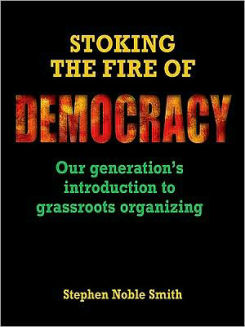
|
Posted April 20, 2010
Book: Stoking the Fire of Democracy: Our generation’s introduction to grassroots organizing Author: Stephen Noble Smith ACTA Publications. Skokie, IL. 2009. Pp. 123 An Excerpt from the Jacket:
An Excerpt from the Book: A 19-year-old student at North Park University in Chicago heard about PACT’s [Public Action for Change Today] campaign to win bus passes for homeless youth. She wanted to help. At the time, I was obsessed with scheduling as many meetings as possible between young people and their city council representatives (in Chicago they’re called “aldermen”), because this was the strategy we had adopted. So I gave this student the green light to schedule a meeting with her alderman, even though I knew almost nothing about her (except that she was in favor of bus passes for homeless youth) and absolutely nothing about her alderman. I figured I would go with her, so how bad could it be? The meeting was a disaster. The alderman berated her for not yet being registered to vote (which I did not know). He reserved even harsher judgement for me for not having registered her to vote before I dragged her in to meet with him (especially because our own literature referred to us as a “young-voter organization”). While it’s true that the alderman was no Mr. Congeniality, I could have (and should have) been better prepared. I wasn’t. I could see only my personal goal or task. There was nothing else, no one else. And because I failed to think about this student and prepare her well for the meeting, neither of us got what we wanted. The organization did not achieve its goal of getting bus passes for homeless youth. Worst of all, though unsurprising, the young woman never showed up for another meeting of our group. She had trusted me with her first foray into public life, and it was horrible. I can only hope she found some other outlet for her desire to do good. We both paid the price for my selfishness. This kind of selfishness is tempting. Here’s how it works; I get passionate about something (such as youth homelessness in our cities); I know what I want to see happen; I think I know how to get there; so I recruit people to help me carry out my vision. I see how people might be able to fit into a campaign, and I convince myself that because they can fit, they must also want to fit. If my agenda is altruistic, then they must want it as well. This pattern of imposing our will on others wears many masks; manipulation, charisma, personality cults. When we want people to do something that they do not really want to do for themselves, they might follow us for a little while. But pretty soon they will feel used, get bored, and quit. Or, even worse from an organizing standpoint, they will come to need us to do things they could well do for themselves. Selfishness has an evil twin — equally as tempting and equally problematic. It’s sometimes called “service,” but here we use the word selfishness. If selfishness is all about me; selfishness is all about you. Either way, someone gets subtracted from the equation. Selflessness goes something like this: “It’s not about me; it’s about them — the poor, the at risk, the unfortunate. I have it so lucky, I just want to do what I can to help people less fortunate than me.” As with selfishness, good things can (and often do) come from selflessness. Hospitals get built and campaigns get won and businesses get formed by egomaniacs and saints alike. But selflessness has it problems, and those problems mirror the problems of selfishness. Rather than subjugating someone else’s humanity (selfishness), we subjugate our own humanity when we do for others exclusively (selfishness). The lesson we teach when we are selfless is that things come for free. Worse, yet, we rob someone of the opportunity to help us; we rob someone of the opportunity to know us as an equal. It is this last condition of selflessness that contains a counterintuitive air of superiority. Selflessness often comes with th3e unspoken subtext: “I know what you want or need better than you do.” Table of Contents: Introduction: What will we fight for? 1. Finding our “why” 2. How not to be a lonely organizer 3. What do we want? And who can get it “for” us? 4. There is only one way to learn 5. It takes a whole body to act 6. Making history Afterword: Who will decide our generation’s legacy? |
|
